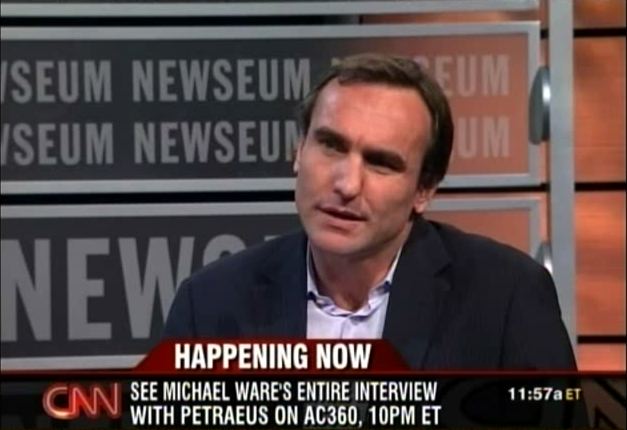NR: "The war is far from over, isn't it?"

Length: 3:25
LARGE (40.1 MB) ----- SMALL (4.0 MB)
Brianna Keiler shows a clip from Michael's interview with General David Petraeus, which was being conducted at the time.
BRIANNA KEILAR: The top U.S. commander in Iraq is in Washington reporting to Congress and President Bush on progress in the war. And you see here our Michael Ware interviewing General Petraeus.
Here is his answer to Michael's question: after hours of testimony, what has been accomplished?
(BEGIN VIDEOTAPE)
GEN. DAVID PETRAEUS, CMDR., MULTINATL. FORCE-IRAQ: Well, what the Ambassador and I sought to do was to provide the latest information, provide a forthright assessment, to describe the situation that we saw and to explain the recommendations that we have made to our chain of command.
I think it was a good opportunity for a lot of back and forth. And, again, we think that that -- we hope that that was useful for them and I'll tell you, obviously, we got certain messages from them as well, as you would imagine.
MICHAEL WARE, CNN CORRESPONDENT: Do you think it hit home?
PETRAEUS: And I think that some of those messages will be heard in Baghdad as well and perhaps in some other capitals.
WARE: And say for example, issues like timetables. We heard that raised perhaps less than one would have expected. Do you think that's a part of you getting your message across?
PETRAEUS: Well, one doesn't know, obviously. Again, we -- we do believe that, again, there have been gains as we described, they're fragile, they're reversible. And we certainly don't want to unduly jeopardize those.
We think, therefore, that having done the substantial reduction that will be complete by July 5 of 20 brigade combat teams, marine expeditionary unit, two marine battalions, really the equivalent of another brigade, it does make sense to let the dust settle, certainly continue in assessments during that timeframe so that we can then make judgments about when we can make additional reductions or recommendations on additional reductions.
You know, I mean, we are keenly aware, as I stated a number of times on Capitol Hill, of the strain on the force, on our troopers and their families on the strategic flexibility, or lack thereof, the cost, all of these different pressures. But of course, our job is to try to accomplish the mission we've been given in Iraq and, of course, that's what is the basis of our recommendations.
WARE: And being perfectly frank with the view that we both share from the ground, I mean, this war is far from over, isn't it?
PETRAEUS: Well, it's tough. And I think that Ambassador Crocker accurately used the word hard, he used it repeatedly and I think it's a correct description.
WARE: We're not coming home any time soon, are we?
PETRAEUS: It is very complex. I think we will be engaged in Iraq. And again, that is the operative word I think, engagement, rather than perhaps exit. But engagement will continue for some time. The question of course, is at what level, at what cost, and in what form.
In other words, what tasks, how much -- when it comes to the military, are we in the lead? How much are they in the lead? Obviously, transitioning that as actually has happened and is happening in a number of areas even as we still in some cases have to take that on ourselves.
WARE: And with ...
(END VIDEOTAPE)
KEILAR: You'll see more of Michael Ware's interview with General Petraeus ahead in the NEWSROOM. You can watch the entire interview tonight at 10:00 p.m. on "AC 360."
